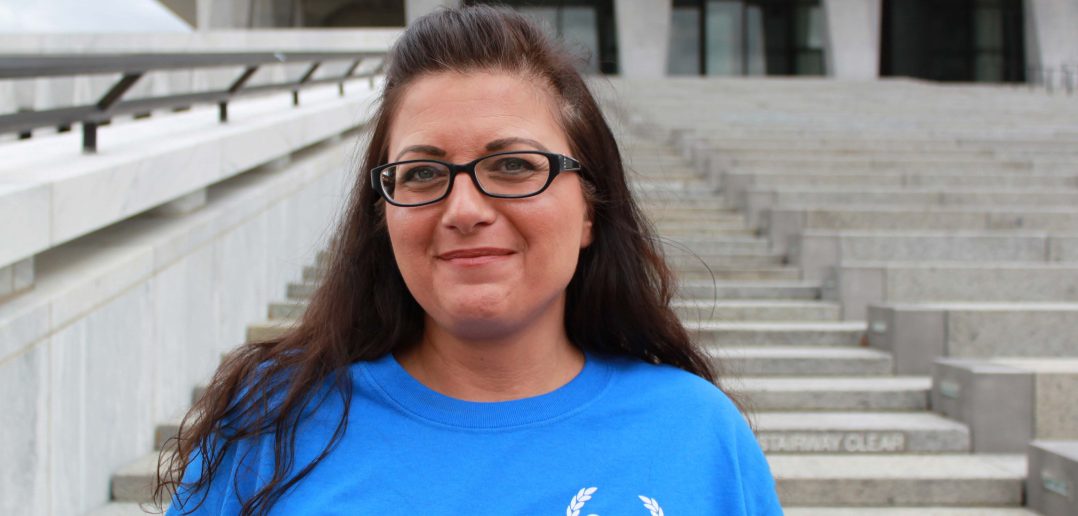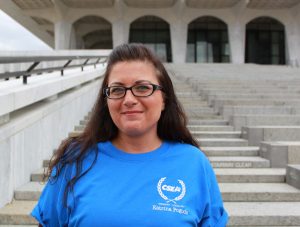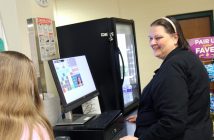Editor’s Note: Shop stewards continue to act in the best interests of CSEA members by being the face of our union at our work sites. They make it their duty to be available to members with questions about our union and our available resources. They are the true labor champions of this union.
Katrina Pogoda, a cleaner at the New York State Museum’s Cultural Education Center in Albany, serves as a shop steward for our union’s State Education Department Local, which includes museum employees.
A CSEA member for more than 20 years, she has been providing her own brand of upbeat counsel to workers all along and recently formalized her role as a steward.
The Work Force’s Therese Assalian met with Pogoda at the museum to learn what motivates her and to hear what advice she has for members.
Therese Assalian (TA): You said you viewed being a steward as a way to “pay it forward.” What do you mean by that?
Katrina Pogoda (KP): I’ve had a lot of support here from my co-workers and local officers. Things weren’t always easy at my job. Some of the frustration stemmed from trying to go from part-time to full-time.
Working at the state, you sometimes see things that aren’t always fair, but I had a lot of support and I am glad I stuck it out. Today, I am in a really good place. I am where I want to be and I do feel a debt. I want to pay it forward.
TA: We talked about good supervisors and bad supervisors, and how some managers’ [poor behavior]can impact and intimidate employees. Can you speak more about that?
KP: I do feel morale in the state work force has dipped since I started.
People don’t feel as secure as they used to and there is a lot of intimidating, bullying behavior by managers. People are afraid to speak up. We are all people. We all live and we all die. [Managers] put their pants on one leg at a time, just like we do. I try to bring humanity back by being friendly, asking people how their day is going and connecting with people.
TA: Do you think that those connections you have with your co-workers makes you more approachable as a representative of “the union?”
KP: Absolutely. Everyone knows me and sees me around. One reason people have a negative view of unions is because they worry they will get in trouble or get fired if management views them as pro-union. Not knowing your rights can only hurt you.
A few years ago, a co-worker was being disciplined. I begged her to call our local officers and get some help. She didn’t have anyone with her when she signed the document they gave her. Just like that, she was out of a job.
TA: What personality traits make a good steward?
KP: I’ve always been the kind of person who asks questions. [It’s important to not be someone who] takes everything at face value. You have to know the contract inside and out. A good steward genuinely cares for others, wants to help people and wants to encourage people to stand up for themselves and know all the options.
TA: What general advice would you give to members reading this?
KP: Don’t be afraid. You have rights. Read your contract. Know what it means. Never be afraid to ask for help. If you have any questions, contact a steward or officer.
Interested in becoming an activist?
If you are interested in becoming a steward, contact your region office to learn more about the required training.
The CSEA Education and Training Department offers a variety of workshops for leadership, activists and members. These workshops are designed to provide information and develop the knowledge and skills needed to negotiate/administer contracts, represent bargaining unit members and build and strengthen the union.
To achieve these skills, a variety of instructional methods are incorporated into the workshops, including:
- Case studies/quizzes
- Role playing
- Lectures
- Discussions
- Demonstrations
- Audiovisual presentations
Visit the CSEA Education and Training page: cseany.org/field-services/education-and-training-2 for a schedule of trainings, including steward training.




